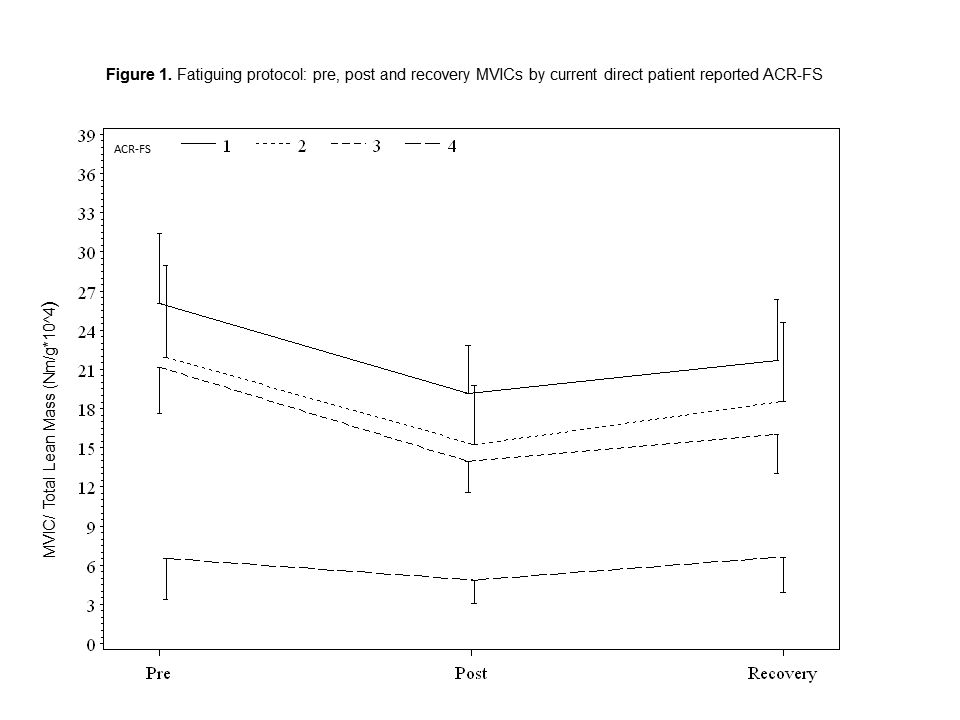Session Information
Session Type: Abstract Submissions (ACR)
Background/Purpose
The American College of Rheumatology classification criteria of functional status (ACR-FS) in Rheumatoid Arthritis is used as a measure of the consequences of impairment in patients with IIMs. However, studies on the utility of applying the ACR-FS on data derived from chart review of patients with IIMs, as well as the relationships among ACR-FS, patient-reported outcome measures of health and physical activity, and objective measures of muscle strength, endurance and fatigability in IIMs are unknown. The goals of this study were to evaluate the predictive value of ACR-FS with known and suspected risk factors of disability, and to relate it with measures of muscle function in IIMs.
Methods
Demographic and clinical data on 118 patients with IIMs were obtained through retrospective chart review. Current ACR-FS was obtained by chart abstraction and direct patient report. Clinical and functional status evaluation, IPAQ, SF-36v2, muscle strength [manual muscle testing (MMT-8) and knee extensor maximal voluntary isometric contraction (MVIC)], muscle fatigability (percent loss of MVIC immediately following a fatigue protocol and after 12 minutes of recovery), muscle endurance (functional index-2) and body composition (Dual x-ray absorptiometry) measures were performed on a subset of 21 patients. Spearman’s correlations were used to examine the relationships between ACR-FS derived from chart abstraction and direct patient report; as well as between physical function, body composition measurements and ACR-FS assessments.
Results
Older age at diagnosis was associated with lower functional status (p=0.045). There was strong correlation between ACR-FS derived from chart abstraction and direct patient report (r=0.782, p=0.0001). There were strong to moderate correlations between ACR-FS assessments and measures of general health, physical function, physical activity, muscle strength and endurance (p< 0.05). ACR-FS correlated best with lower extremity portions of the FI-2. Previous research has shown that performance tests of lower extremity function alone can accurately predict disability across diverse populations. Figure 1 shows pre, post and recovery MVIC normalized to total lean mass by ACR-FS by patient report. Pre, post and recovery MVICs clearly distinguished patients with no disability, mild to moderate disability, and severe disability. Pre, post and recovery MVICs were largely reduced in patients with severe functional status impairment, although this was not statistically significant.
Conclusion
Age related frailty is likely an important contributor of functional impairment in older IIM patients. The ACR-FS is a simple measure of disability that can be used in chart abstraction studies involving IIM patients. We have demonstrated that ACR-FS correlates well with muscle performance tests of strength, endurance and fatigue, in general.
Disclosure:
L. Cleary,
None;
L. J. Crofford,
None;
A. Srinivas,
None;
H. Bush,
None;
C. Starnes,
None;
Q. Fan,
None;
J. Duan,
None;
K. Jenkins,
None;
N. Fraser,
None;
M. Rutledge,
None;
B. Hanaoka,
None.
« Back to 2014 ACR/ARHP Annual Meeting
ACR Meeting Abstracts - https://acrabstracts.org/abstract/physical-impairment-in-patients-with-idiopathic-inflammatory-myopathies-is-predicted-by-the-american-college-of-rheumatology-functional-status-measure/

